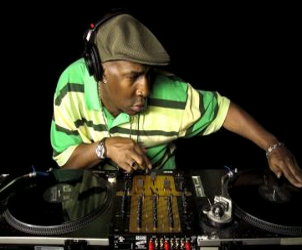None of the acts at this year’s Siren Festival convinced me that they were rock ‘n roll’s second coming, but I certainly had a lot of fun. The festival went down Saturday within the calefactory confines of Coney Island. I think it’s safe to say that Islands — the Montreal band made up of ex-Unicorns members known for their dual violin players and lengthy, transition-laden songs — certainly came away the winner. Islands started thirty minutes late, with vocalist Nicholas Thorburn emerging onto the stage with a trash can over his head and suggesting that the crowd should take their pants off to beat the heat. He complained of bad luck, perhaps a reference to the constant arguments I observed between the bands and the sound guys. While Islands isn’t quite as good as it was during the Jamie Thompson days and the guitarist (Patrick Gregoire?) mangled many notes on the otherwise fine performance of “Swans (Life After Death)” that closed out the set, Islands nevertheless played a strong show, mostly composed of tunes from their uneven second album.
I’m sorry that I caught Parts & Labor midway through its set. The Brooklyn band, like many acts these days, drew upon The Replacements as their main inspiration, but with some geeky keyboarding thrown in for good measure. They reminded me of some music geeks I used to know in Sacramento, and I may have to check them out in the future.
I now have a soft spot for Jaguar Love and, in particular, Johnny Whitney — a vocalist with an uncombable shock of flaxen hair and a flamboyant swagger. The band offered a somewhat formulaic Glasgow art rock sound, but, unlike some of the bands who played and took their gigs for granted, Jaguar Love knew how to have fun on stage. Whitney screeched out songs like some campy amalgam of Zack de la Rocha and Mick Jagger: his left arm frequently a-kimbo, his thumb and forefinger often squeezing inches of the air as if to offer some belated response to Bill Clinton’s presidential channel-changing gesture. If a set can be judged by how long a beach ball remains in the air batted around by a crowd, Jaguar Love certainly won on this point. There was even a bit of crowd surfing.
I’ve been on the fence about The Dodos for a while, not really caring for or against the music. But now that I’ve seen them live, I’m convinced that the band should rename itself The Three Douchebags. They truly give San Francisco a bad name. Meric Long isn’t much of a slide guitarist and he doesn’t seem to know how to tune a guitar (although perhaps this was the heat warping his instrument or the spliffs warping his mind). Long’s the kind of self-entitled solipsist who really needs to be bruised up in a dive bar brawl to learn the meaning of humility. The band was terrified of appearing naked and imperfect before the crowd, openly bitching about the sound, with Long relying on two mikes — one with mild reverb, the other with heavy reverb; you can guess which mike he used more frequently — to belt out his humorless songs. Despite the promising possibility of a trash can used as percussion, the band seemed to view their set as a live reproduction of their studio recordings. Long performed almost entirely sitting in a folding chair. The Dodos were perfunctory and soulless. I could have had more fun reading a few chapters of a mediocre novel. But morbid curiosity kept me there until the end.
I’m at a point in my life where I’ve grown tired of arrogant 23-year-old musicians who go up on stage and have nothing to justify their hubris. I suppose some arrogance is excusable if the musician has the chops or the personality to back it up. But there isn’t anything within The Dodos’s sound to suggest even the metaphorical residue of a prominent extinct species. Johnny Whitney may have been a bit preposterous, but let’s again consider the beach balls. At the beginning of The Dodos’s set, there were three beach balls being tossed around in the air. Two songs in, the audience stopped batting the balls. The audience took in their joints. Some sang along. But on the whole, The Dodos demonstrated that they were not a band worth standing in the summer heat for. Thankfully, there were plenty of other bands willing to pick up the slack.


 Corresponent: If you listen to “The Wheels of Steel” today, as I have actually a couple of times, you can actually hear your hands on the turntables, whereas you can’t always hear someone who is just doing a mashup. You don’t hear that analog quality. So I’m wondering how things have adjusted for you in light of this. How do you keep the analog part of things legitimate? Real? How do digital tools help you as well?
Corresponent: If you listen to “The Wheels of Steel” today, as I have actually a couple of times, you can actually hear your hands on the turntables, whereas you can’t always hear someone who is just doing a mashup. You don’t hear that analog quality. So I’m wondering how things have adjusted for you in light of this. How do you keep the analog part of things legitimate? Real? How do digital tools help you as well? Correspondent: It’s interesting that something like “Everleighed,” as well as “decentized,” which you point to later in the book — these are verbs that didn’t quite make it in the 21st century.
Correspondent: It’s interesting that something like “Everleighed,” as well as “decentized,” which you point to later in the book — these are verbs that didn’t quite make it in the 21st century.